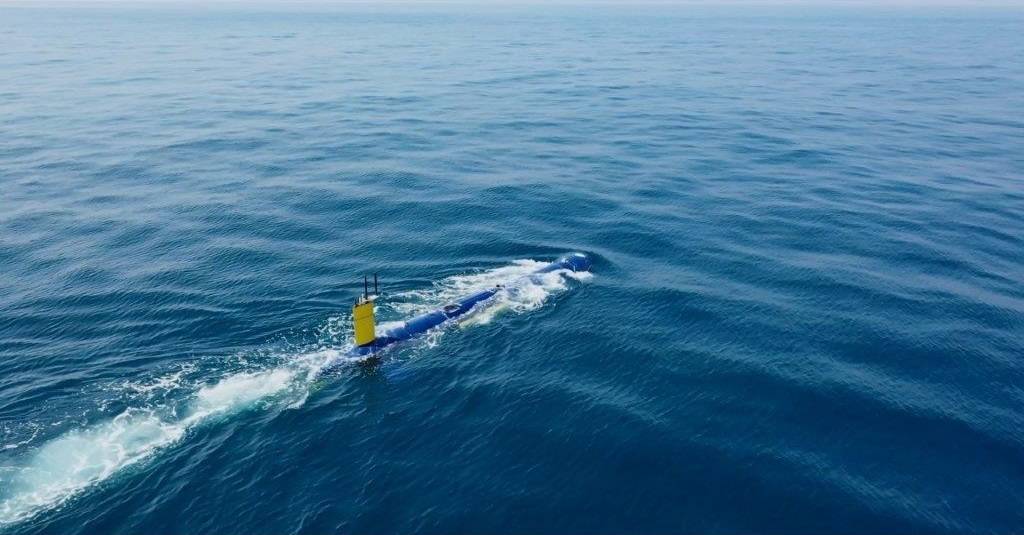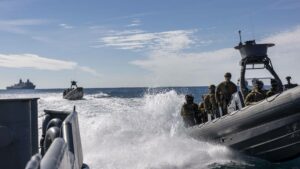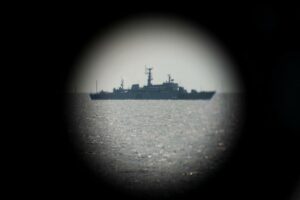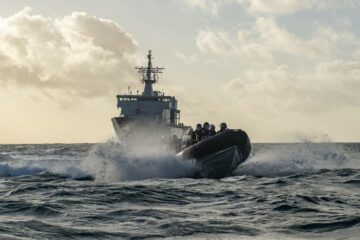
JERUSALEM — Israel Aerospace Industries has developed a new unmanned submarine, the BlueWhale, designed for covert intelligence-gathering operations, the company said May 4.
The underwater vehicle is almost 11 meters long and just over 1 meter in diameter. Coming in at 5.5 tons (11,000 pounds), the platform can fit in a 40-foot shipping container for transport by land, sea or air. The size of the vessel is similar to deep-submergence vehicles or so-called crewed midget submarines.
It can travel at up to 7 knots underwater, and using electrical power, the submarine can operate for two to four weeks, depending on the mission, the company said.
Its range, at an average speed of 7 knots for 10 days, would be more than 1,600 nautical miles (1,841 miles).
The platform can detect submarines and gather acoustic intelligence using radar and electro-optical technology, according to the company. It has a mast, like larger crewed submarines, and a telescope to help detect targets at sea and on the coast, the company added in a statement.
“It is also equipped with dedicated sonars to enable the detection of both manned and unmanned submarines, and map mines on the seabed,” IAI noted, as well as “a special sensor suite [that] ensures safe transit for the submarine both below and in the proximity of the sea surface.”
The company also said the sub can conduct acoustic intelligence as well as search for and detect naval mines on the seabed. Mine detection is conducted with dedicated synthetic aperture sonar, attached to the sides of the vessel.
“By using a satellite communications antenna on the mast, the gathered data can be transferred in real-time to command posts, anywhere in the world, at sea or on land. Submarine detection and acoustic intelligence-gathering data is enabled using a sonar, several tens of meters long, towed by the BlueWhale, and by flank array sonar with receiver arrays attached to both sides of the platform,” IAI said in the statement.
The company added that BlueWhale has “undergone thousands of autonomous operation hours, including intelligence-gathering for both maritime and coastal targets, acoustic intelligence, and identifying the presence of naval mines.” It also noted the platform can perform a portion of operations performed by crewed subs and can operate for several weeks at a time at “minimal cost and maintenance, without the need for operators on board.”
The BlueWhale has a sensor suite to help ensure its safe transit underwater or near the surface. In recent years, a number of international patents were registered regarding development of the system, the company said.
IAI did not elaborate on the cost of the system.
Navies around the world are seeking more unmanned solutions at sea, particularly the U.S. Navy, which wants to field more unmanned vessels and is running a program in the Gulf region to test unmanned surface units. In 2021, IAI partnered with Emirati conglomerate Edge Group to develop unmanned surface vessels.
Underwater threats, such as the destruction of the Nord Stream pipeline, which several countries have blamed on sabotage, are driving these efforts.
Seth J. Frantzman is the Israel correspondent for Defense News. He has covered conflict in the Mideast since 2010 for different publications. He has experience covering the international coalition against the Islamic State group in Iraq and Syria, and he is a co-founder and executive director of the Middle East Center for Reporting and Analysis.
- SEO Powered Content & PR Distribution. Get Amplified Today.
- PlatoAiStream. Web3 Data Intelligence. Knowledge Amplified. Access Here.
- Minting the Future w Adryenn Ashley. Access Here.
- Buy and Sell Shares in PRE-IPO Companies with PREIPO®. Access Here.
- Source: https://www.defensenews.com/unmanned/2023/05/05/israeli-firm-reveals-unmanned-submarine-bluewhale/
- :has
- :is
- :not
- $UP
- 000
- 1
- 10
- 11
- 2021
- 7
- 70
- a
- According
- added
- Aerospace
- against
- AIR
- also
- an
- analysis
- and
- antenna
- anywhere
- ARE
- around
- Array
- AS
- At
- autonomous
- average
- BE
- below
- board
- both
- Both Sides
- by
- CAN
- Center
- Co-founder
- Coast
- coming
- Communications
- company
- Conduct
- conducted
- conflict
- conglomerate
- Container
- Cost
- countries
- covered
- covering
- data
- Days
- dedicated
- Defense
- Depending
- designed
- Detection
- develop
- developed
- Development
- DID
- different
- Director
- driving
- East
- Edge
- efforts
- Elaborate
- enable
- enabled
- ensure
- ensures
- equipped
- executive
- Executive Director
- experience
- field
- Firm
- fit
- For
- four
- gather
- Group
- Have
- he
- help
- HOURS
- HTTPS
- identifying
- images
- in
- Including
- industries
- Intelligence
- International
- iraq
- Islamic
- Islamic State
- Israel
- Israeli
- IT
- ITS
- jpg
- just
- Land
- larger
- like
- Long
- maintenance
- map
- Maritime
- May..
- Middle
- Middle East
- mines
- Mission
- more
- Near
- Need
- New
- news
- Nord Stream
- Nord Stream pipeline
- noted
- number
- of
- on
- operate
- operation
- Operations
- operators
- or
- over
- particularly
- Patents
- perform
- pipeline
- platform
- plato
- Plato Data Intelligence
- PlatoData
- Posts
- pounds
- power
- presence
- Program
- publications
- radar
- range
- real-time
- recent
- regarding
- registered
- Reporting
- Reveals
- running
- s
- safe
- Said
- satellite
- SEA
- Search
- seeking
- several
- Shipping
- Sides
- similar
- since
- Size
- Solutions
- special
- speed
- State
- Statement
- stream
- such
- suite
- Surface
- synthetic
- Syria
- system
- targets
- Technology
- telescope
- tens
- test
- than
- that
- The
- the world
- These
- thousands
- time
- to
- tons
- transferred
- transit
- transport
- travel
- two
- underwater
- units
- using
- vehicle
- Vehicles
- Vessel
- wants
- Weeks
- WELL
- were
- which
- with
- without
- world
- would
- years
- zephyrnet











